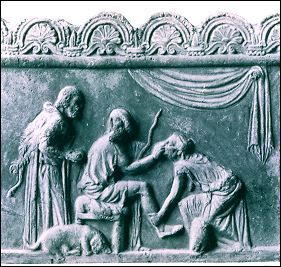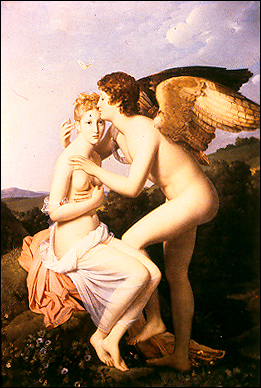|
YOU THE RESEARCHER AND LITERARY INTERPRETER
Select a topic from those suggested that you wish to pursue in a research paper. Look into your topic and its suitability before settling in. This is the crucial decision. Come see me about your idea in office hours (3-4 MWF) or by appointment. We can chat by email, if you prefer, but this method is less efficient. Your topic must be amenable to research at our level an0d I will help guide you in this. Homeric topics are especially welcome, but the choice is yours as long as the class has read by week 8 at least one text that you investigate. Notify me of your choice in writing or by email by week 8. This paper is your most important independent activity of the term. I have suggested some topics during lectures and discussion and you can find more at the bottom of this page. Order ASAP any books or articles that Beeghly Library does not contain. Consort/ILL gets slower and more difficult after Thanksgiving. If you wish to examine a different topic (fine in principle), I must approve the request in writing. To insure a sound paper, we divide the work into three stages. Save and submit all previous stages with each delivered stage (portfolio concept). Here are the due dates for your typed submissions. Earlier delivery is encouraged and eulogized. Start now! Keep each stage on a diskette in a separate file and copy for later stages. Copy these dates into your appointment book, palm-pilot, or amanuensis’s brain.
(Week 9, Stage 1) Investigate this worthwhile and interesting term-paper topic and sooner is better, though. This single page should include a working title, a meaty paragraph describing your topic and stating a provocative and demonstrable thesis. Further, find at least six items of bibliography including at least two books or monographs (Classical Literature is in PA, Greek History in DG), and at least two articles--all published since 1975 (I will make exceptions for this date for especially useful earlier studies). The best first place to look for relevant bibliography is a recent book or journal survey (esp. in Classical World and Greece & Rome) on your topic, author, work, etc. Most on-line sources, the Consort catalogue, or an encyclopedia are not as helpful for generating bibliography. Bibliographical surveys exist for many classical authors; see me or the bibliography of relevant translations that we are using. Annotate and present correctly all bibliographical entries (including multi-editor volumes). Ask me if in doubt, or follow the style of one of our texts (or another of your sources).One-sentence annotations concisely indicate how each item is relevant to your topic and what it uniquely contributes to the growth of your thinking. Publisher's name is optional. Observe the precise form in the Macauley/Lateiner edition of Herodotus. Histories, or in any critical work of Classical scholarship, or in the current OWU English Handbook. Sample of acceptable annotated bibliographical entry (note the absence of these words: Vols., pages, etc.): Lateiner, D. 1997. “Homeric Prayer,” Arethusa 30.2: 231-72. A study of who prays, when and how, in the Homeric epics, especially the Odyssey. Differences from other ancient prayer sources and modern are discussed. Useful bibliography. (Week 11, Stage 2) Deliver a full proper outline OR thorough, coherent sketch (2-3 pp.) indicating your thesis (a provable/falsifiable idea), all your ancient sources, your method, your expectations of what you think you will find, and an expansion of your annotated bibliography of critical works. How expanded? Up to you, and the count is not itself significant, but “double” would be a modest goal. The bibliography also includes bibl. information on any translations that your paper cites or refers to. This stage is due before Thanksgiving Break. Continue work over break, because things get hairy in December. (Week 13, Stage 3) Your final paper fleshes out stage 2. All the necessary and logical connections appear. Revise a full draft of stage 3 before handing the final version to me. Sources both ancient and modern are cited fully and correctly in the text or in notes (e.g., Soph. Phil. 433-35; Fantham, et al. Women [1994] 25). When in doubt, footnote it out. Consult OWU Student Handbook on unintentional plagiarism. Bibliographical and footnote citations follow different formats. THE DEADLINE FOR THE COMPLETE PAPER IS 5:00 PM on Friday, week 13. LATE PAPERS (e.g., 4 December) LOSE CREDIT. If these deadline dates seem unclear, please ask for exegesis. If you are thinking of another topic, you must discuss it with me before beginning research. I want a focused study of a limited question that depends on a close reading of the text(s). SUGGESTED TOPICS
EPIC
LYRIC
TRAGEDY
ANCIENT NOVELS
MORE TRAGIC TOPICS
HERODOTEAN HISTIRIOGRAPHY
COMBINATIONS
|
|---|
Humanities-Classics
Department
216 Sturges Hall
Ohio Wesleyan
University
Delaware OH 43015
USA
Term Paper Stages - HMCL: Ancient Literatures and Thought

Eurykleia washing
Odysseus' feet

Parthenon

Cupid and Psyche
